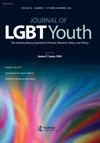Adverse childhood experiences and utilization of preventive healthcare among Generation Z sexual and gender minorities
IF 1.8
Q1 SOCIAL SCIENCES, INTERDISCIPLINARY
引用次数: 1
Abstract
Abstract Historically, sexual and gender minority populations may have faced multiple Adverse Childhood Experiences (ACEs) and their utilization of preventive healthcare is low. However, sociocultural changes in attitudes and policies affecting sexual and gender minority populations signal their broader societal acceptance. We examined the prevalence of ACEs among sexual and gender minority populations belonging to Generation Z (those born between 1990-early 2000s) and their utilization of preventive healthcare to identify areas for health promotion. We used the Philadelphia Expanded ACEs questionnaire as well as questions about demographics and preventive healthcare use in a cross-sectional online survey design. The participants (n = 160) were chiefly female (n = 105, 65.6%) and bisexual (n = 51, 31.9%), while gender non-binary comprised 10.6% (n = 17). Most (93.75%, n = 150) participants reported three or more ACEs. ACEs were significantly associated with preventive healthcare use (p = 0.02). Higher prevalence of ACEs was associated with a 0.05 reduction in preventive healthcare utilization. Despite protective factors such as a comparatively advantaged background (based on their annual household income), health insurance, and college education, high ACEs, sexual orientation, and gender identity remained significantly associated with low utilization of preventive healthcare.Z世代性和性别少数群体的不良童年经历和预防性保健利用
从历史上看,性少数和性别少数人群可能面临多重不良童年经历(ace),他们的预防性保健利用率低。然而,影响性少数群体和性别少数群体的态度和政策的社会文化变化表明他们得到了更广泛的社会接受。我们研究了Z世代(1990年至21世纪初出生的人)性和性别少数群体中ace的患病率,以及他们对预防性医疗保健的利用情况,以确定健康促进领域。我们在横断面在线调查设计中使用了费城扩展ace问卷以及关于人口统计学和预防性医疗保健使用的问题。参与者(n = 160)主要为女性(n = 105,占65.6%)和双性恋(n = 51,占31.9%),非二元性别占10.6% (n = 17)。大多数(93.75%,n = 150)参与者报告了3次或更多的ace。ace与预防性保健使用显著相关(p = 0.02)。ace的高患病率与预防性医疗保健使用率降低0.05相关。尽管有诸如相对有利的背景(基于家庭年收入)、医疗保险和大学教育等保护性因素,但高ace、性取向和性别认同仍然与预防性保健的低使用率密切相关。
本文章由计算机程序翻译,如有差异,请以英文原文为准。
求助全文
约1分钟内获得全文
求助全文
来源期刊

Journal of LGBT Youth
SOCIAL SCIENCES, INTERDISCIPLINARY-
CiteScore
5.40
自引率
8.30%
发文量
30
期刊介绍:
The Journal of LGBT Youth is the interdisciplinary forum dedicated to improving the quality of life for lesbian, gay, bisexual, transgender, and questioning youth. This quarterly journal presents peer-reviewed scholarly articles, practitioner-based essays, policy analyses, and revealing narratives from young people. This invaluable resource is committed to advancing knowledge about, and support of, LGBT youth. The wide-ranging topics include formal and non-formal education; family; peer culture; the media, arts, and entertainment industry; religious institutions and youth organizations; health care; and the workplace.
 求助内容:
求助内容: 应助结果提醒方式:
应助结果提醒方式:


